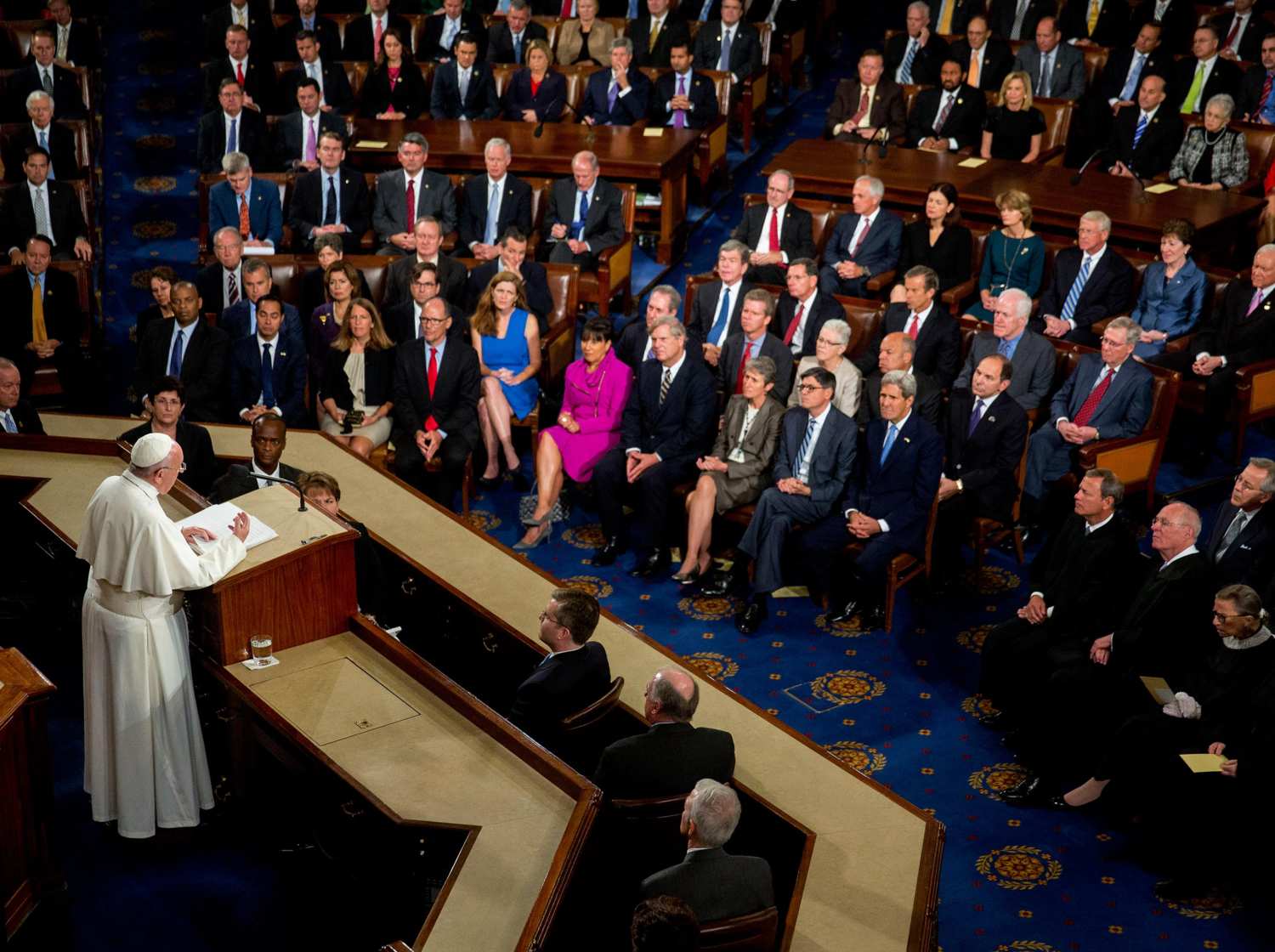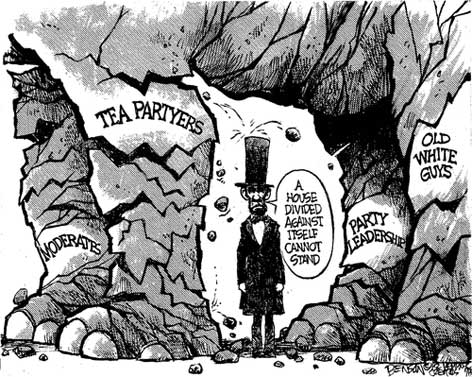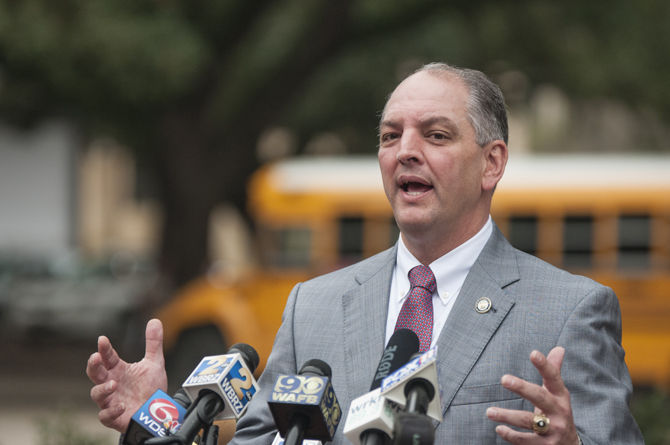“Politics is…an expression of our compelling need to live as one, in order to build as one, the greatest common good.”
A recurring theme of Pope Francis’ historic address to Congress on Thursday, September 24, was one of unity and the need for sustained dialogue in order to strive for the “greater good.” The Pope, the first pontiff to speak to a joint session of Congress, discussed global issues ranging from the refugee crisis and climate change to arms trading and the death penalty.
Regarding reforms at home, Pope Francis’ address struck a blow to the U.S. military-industrial complex when he alluded to U.S’s arms trade where “deadly weapons are being sold to those who inflict untold suffering…for money, money drenched in blood.” He urged the Congress to break the “shameful and culpable silence” around the issue as it is “our duty to confront” the problem. Pope Francis later moved the discussion to a more international scale when he called for a “global abolition of the death penalty.” He stated that “every life is sacred,” a subtle allusion to the issue of abortion, and that people “must never exclude…hope…and…rehabilitation.” The pontiff also gave a nod of support to bishops who have “renewed their call for the abolition of the death penalty” in the U.S., where the death penalty is still legal.
Despite his criticisms of certain aspects of American global and domestic policy, the Pope’s speech strove to inspire and encourage the American people. In his discussion of the global refugee crisis, the Pope again called upon the philosophy that all life is sacred. He cited the Golden Rule of “do unto others as you would have them do unto you” and implored nations and individuals alike to “view [refugees] as persons, seeing their faces and listening to their stories.” He also addressed the issue of immigration, calling himself a “son of immigrants” and calling upon others to remember their own immigrant histories. He closed with, “we must now resolve to live as nobly and justly as possible” and “not turn [our] backs on our ‘neighbors,’” taking a more liberal view on immigration, a heated issue in not only the U.S. but also the rest of the world.
Pope Francis’ comments on climate change and the role humanity plays in that change also garnered much attention. In an age where science overwhelming shows evidence of humankind’s part in climate change and with parts of the world still skeptical or not aware of the issue, the Pope’s open support of environmentalism, through his speech to Congress and his recent encyclical, could have major impacts on future awareness, discussion, and even policy concerning the issue.
Throughout the address, Pope Francis also highlighted four famous Americans, Martin Luther King, Abraham Lincoln, Dorothy Day, and Thomas Merton, who embodied the same themes of his speech and “shaped fundamental values which will endure forever in the spirit of the American people.”
While the Pope’s message clearly centered on unity and oneness, the partisan divisions among the Congress were also clear to see from the address footage. As the Pope commented on the “important role [the U.S. Congress] had to play” in combatting the “human roots” of climate change, he was met with the applause of House and Senate Democrats, with a noticeable lack of applause from Republicans. There was a similar response when the Pope talked of the global refugee crisis. However, when discussing his more conservative “concern for the family, which is threatened…as never before,” most likely a comment on gay marriage in America, the Republicans applauded vehemently. The Pope’s urging for cooperation and fraternity, while influential and ideal, may be falling on deaf ears in a legislature that is increasingly polarized.
Despite the U.S.’ own partisan divisions, the Pope was largely welcomed and praised by the Congress, just as he has been by the American people. With about 51 million practicing Catholics and a third of the population stating to have been raised Catholic, Catholic-Americans have come out in droves to see the pontiff during his visit. The current pontiff has also been a celebrity among non-Catholics as well, receiving support and praise from people across the board. Since being named the pope in 2013, Pope Francis has been hailed as a world leader in spirituality, humility, and social causes. He has also been named TIME Magazine’s Person of the Year and been dubbed the “People’s Pope.”
After the speech at the Capitol, the Pope continued to live up to his reputation as the “People’s Pope” when he dined with the homeless of the city instead of legislators from Capitol Hill. The next leg of his trip was New York, where he addressed the United Nations (U.N.) on the morning of Friday, September 25. Similar his congressional speech, themes of unity and peace pervaded the U.N. address. The culmination of Pope Francis’ inaugural six day visit to the United States was a mass at the World Meeting of Families, the largest Catholic family gathering, in Philadelphia, Pennsylvania.
Although the Pope has enjoyed popularity in the U.S., he has not avoided all controversy and opposition. Most recently, his canonization of Junipero Serra, a Franciscan monk and the first Hispanic to be canonized, drew criticism from Native American groups across the country who cited Serra’s role in the abuse and enslavement the Native people. The Pope’s remarks on Thursday at the Capitol have also drawn comments from many Catholics and politicians who call him too progressive and believe that he should have discussed issues like family and abortion in greater detail. Despite his seemingly progressive lean, the Pope has conservative and traditional views on many issues like abortion, women bishops, and gay marriage, as expected by the nature of his profession. In fact, there was even worry before his arrival that the pontiff may speak directly against some of the Democrats’ more liberal views.
No matter his popularity and charm or his controversy and style, Pope Francis’ influence as a world leader is undeniable. His bold topics and ideals for America, while not certain to be acted upon, will no doubt sustain conversation about key issues that may become pivotal in the future presidential election. His visit has not only served as a reminder that politics and dialogue serve to better a nation, but it has also challenged the U.S. with new perspectives and views on issues that have seemed to run stale. While the visit was undoubtedly historic, only time will tell whether it will leave a lasting influence on U.S. politics.
Link to full transcript and full audio.
Photo: NY Mag


